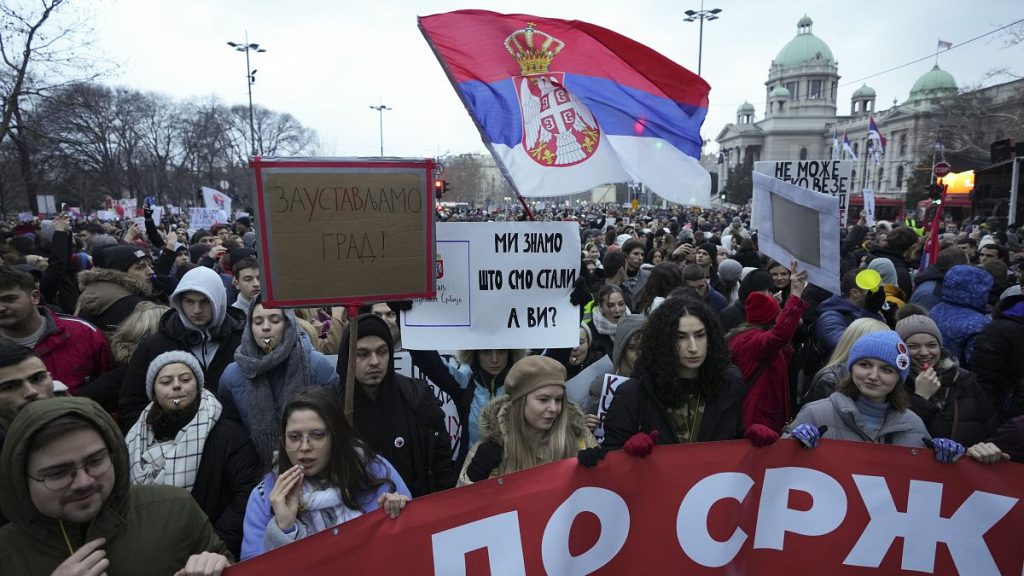Serbian university students have initiated a series of protests, triggered by the tragic collapse of a concrete canopy at the Novi Sad railway station in November 2023. This incident, which claimed the lives of 15 people, has ignited widespread public outrage and sparked accusations of corruption and negligence against the government. The student protests, marked by a 15-minute silent vigil in front of the Constitutional Court in Belgrade, have evolved into a broader expression of discontent against President Aleksandar Vučić’s increasingly authoritarian rule. The students’ central demand is accountability for the canopy collapse, which many believe was a direct consequence of substandard reconstruction work facilitated by corrupt practices. The renovation of the railway station, involving Chinese state companies, has come under intense scrutiny, fueling suspicions of impropriety and a lack of oversight.
The student protests, which have resulted in the suspension of university classes for weeks, have been met with resistance from the government and its affiliated media outlets. President Vučić has publicly accused the students of being funded by Western interests to destabilize the country. Furthermore, pro-government media have engaged in a campaign of intimidation, publishing personal data of some protesters, a tactic that strongly suggests the involvement of Serbia’s secret service (BIA). This blatant disregard for privacy has raised serious concerns about the government’s commitment to civil liberties and the rule of law. Students have reported experiencing pressure from state security, including intimidating “friendly” invitations for questioning and veiled threats against their families. This climate of fear and repression underscores the challenges faced by those who dare to criticize the government.
The students’ grievances extend beyond the immediate cause of the canopy collapse, reflecting a deeper unease with the erosion of democratic norms under Vučić’s leadership. While publicly espousing a commitment to European Union membership, Vučić has been accused of systematically undermining democratic freedoms and consolidating power around his presidency. This dichotomy between his professed pro-European stance and his increasingly autocratic actions has further fueled public distrust and emboldened the protest movement. The students’ demands resonate with a wider public increasingly weary of Vučić’s tight grip on power and the suppression of dissent.
The student protests have gained significant traction, attracting widespread public support and drawing tens of thousands of participants to their rallies. This groundswell of popular support represents a significant challenge to Vučić’s authority, marking perhaps the most substantial resistance his regime has faced to date. During their demonstrations, the students have publicly read articles of the Serbian Constitution they claim have been violated by the government’s repressive tactics. This symbolic act highlights their commitment to upholding democratic principles and challenging the government’s perceived disregard for the rule of law.
While prosecutors have filed charges against 13 individuals in connection with the canopy collapse, including a government minister and several state officials, skepticism remains about the independence and impartiality of the investigation. Given the government’s track record of suppressing dissent and controlling the judiciary, there are legitimate concerns about whether a truly independent and thorough investigation can be conducted under the current political climate. This skepticism underscores the erosion of public trust in state institutions and the perceived impunity enjoyed by those connected to the ruling elite.
President Vučić, in his characteristically dismissive manner, has downplayed the significance of the student protests, labeling them “stupid” and attributing them to the influence of their professors. He has also reiterated his intention to remain in power until he decides otherwise, demonstrating his unwavering grip on the levers of power. This defiant stance, coupled with the government’s continued efforts to discredit and intimidate protesters, suggests a deepening political crisis in Serbia. The clash between the government’s authoritarian tendencies and the growing demands for accountability and democratic freedoms sets the stage for a protracted period of political tension and unrest.

